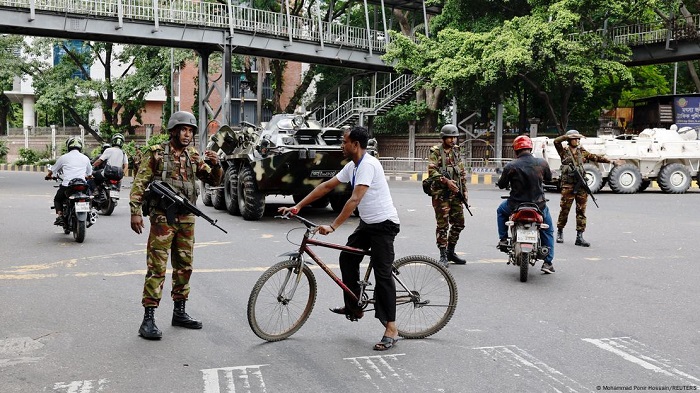
New Delhi: The United Arab Emirates (UAE), known for its strict laws to maintain public decorum and uphold its reputation as a global business centre, has jailed as many as 57 Bangladeshi nationals for holding agitation in the Gulf country in solidarity with Bangladesh's anti-quota protest, which has supposedly been hijacked at a stage by organisations and political groups backed by Pakistan's central intelligence agency.
According to reports by official Emirati news agency WAM (Emirates News Agency), among the 57 Bangladeshi nationals punished by the UAE's Abu Dhabi Federal Court of Appeal, three were sentenced to life, one to 11 years in prison and remaining 53 to 10 years for “gathering and inciting riots” during protests last week.
The WAM also reported that those Bangladeshi nationals would be deported after the completion of their prison terms.
“The court heard a witness who confirmed that the defendants gathered and organised large-scale marches in several streets of the UAE in protest against decisions made by the Bangladeshi government,” WAM noted.
Qatar-based Al Jazeera reported, citing a witness, that the defendants organised large-scale marches and held protests in several streets of the UAE against their home government.
Authorities in the UAE, last week, ordered a probe and an expedited trial of the arrested Bangladeshi nationals.
The UAE’s attorney general’s office on Saturday indicted the Bangladeshis on several charges, including “gathering in a public place and protesting against their home government with the intent to incite unrest,” obstructing law enforcement, causing harm to others and damaging property, according to WAM.
Most of the Bangladeshis living in the Emirates are labourers as the Bangladeshi nationals make up the third-largest expatriate community in the UAE - a federation of seven sheikhdoms.
Political parties, labour unions and unauthorised protests are prohibited in the UAE and the country's penal code criminalises offending foreign states or jeopardising ties with them, as per reports.
Earlier this month, protests led by students started in Bangladesh after the Bangladesh High Court last month reinstated a government quota system that reserved more than 50 percent of the civil services jobs.
Students demanded that job quotas, which include 30 percent reserved for descendants of Muktijoddhas — the freedom fighters who participated in the 1971 war of independence- be abolished amid stagnant job growth and high rates of youth unemployment in the South Asian nation.
The quota reintroduction enraged students facing an unemployment crisis in Bangladesh -- a nation with some 18 million youths without jobs today, according to figures provided by the government.
The protest was initially peaceful, but it later metastasized into an all-out revolt against the Sheikh Hasina government in Bangladesh.
According to local media reports, the role of ChhatraShibir — the student wing of the outlawed Jamaat-e-Islami backed by Pakistan's Inter-Services Intelligence (ISI) — is under scanner for instigating violence and transforming student protests into a political movement in Bangladesh as there are signs that the protest has been hijacked by radical elements in the country.
Jamaat’s student body ChhatraShibir is tipped to be funded by the Pakistan army and its top intelligence agency to destabilise the Awami League government.
Meanwhile, the role of some West-backed NGOs in the current crisis is also being tracked by the Bangladeshi intelligence agencies, as per reports.
Chinese Ambassador to Bangladesh, Yao Wen, last week (July 17) reportedly held a meeting with senior leaders of main opposition party BNP, including Air Vice Marshal (Retd.) Altaf Hossain Chowdhury, BNP Vice Chairman & former Home Minister, and Shama Obaid, Organising Secretary, at the Chinese Embassy in Dhaka.
The Chinese Ambassador described the ongoing protest-turned-violence as Bangladesh’s internal matter, adding that the people and government of Bangladesh were fully capable of maintaining peace in the country.
In Bangladesh, the week-long violence claimed the lives of more than 200 people, including students, law enforcement officers and general people, though students estimate the true figures to be significantly higher as security forces battle demonstrators armed with sticks and rods, according to local media reports.
As per reports, police opened fire upon protesters from armoured vehicles and even from a helicopter.
When the situation went almost out of hand, the Sheikh Hasina government last week decided to deploy the army, impose a countrywide "indefinite" curfew and issue a "shoot-at-site" order.
So far, many thousands more have been arrested in Bangladesh, with some student activists alleging they were tortured in detention, as reported by local media.
Time Magazine reported, quoting Michael Kugelman, director of the South Asia Institute at the Wilson Center, that this was the biggest crisis that Bangladesh PM Sheikh Hasina has faced over her 15 straight years in power.
“It’s a really big deal and striking because it seemed to come out of nowhere,” Michael Kugelman told Time Magazine.
Calling the level of bloodshed "unprecedented" in modern times, Bangladeshi-American political scientist and professor at Illinois State University, Ali Riaz, told Time Magazine, “Bangladesh has experienced political violence and uprisings throughout its history, but never were so many people killed, let alone within such a short period.”
“The ferocity of police and [border guard paramilitary] has surpassed all previous incidents of political violence and state response,” Riaz added.
Meanwhile, while life in Bangladesh is returning to normal gradually, the UAE action against the protesters sent a loud and clear message- the country does not want its land to be used against a sovereign nation's internal affairs and protesters should think twice.
While the court-appointed defence lawyer argued that there the gathering of expat Bangladeshis had no criminal intent and that the evidence was insufficient, demanding the acquittal of the defendants, the court found sufficient evidence of their guilt and convicted them, according to a Khaleej Times report.